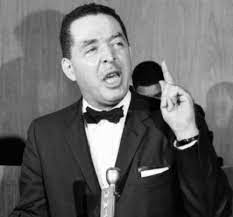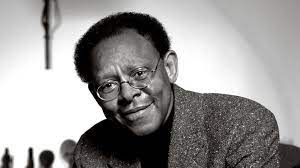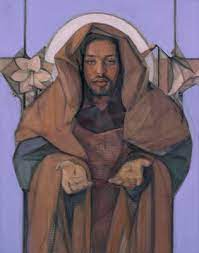Jesus Among the Disinherited
In my previous blog I reflected on Howard Thurman’s depiction of Jesus in his book Jesus and the Disinherited. Based on Thurman’s understanding, I said Jesus was not a charismatic outsider coming to “rescue” the poor, but rather was one who himself was also oppressed and impoverished. I went onto stress that Thurman makes clear that Jesus did not come to prop up the status quo but came with a radical and prophetic mission to challenge the powerful and those who would use the Christian religion as a club to demean, oppress and exclude those who are poor, BIPOC and economically struggling. In this entry I want to build on this depiction of Jesus by looking at how two prominent Black theologians characterized Jesus.
My Introduction to Black Jesus: Albert Cleage
In the spring of 1975 during my last semester at Duke University, I took a course entitled “Religion and Theology of Black Americans.” In addition to the subject matter the course was significant for two reasons. First, it was only the second course I had taken taught by an African American professor (the other was an English course during my sophomore year). Second, it was the only course at Duke where all students in the class were African Americans, except for me and one other white student. There were not many Black students at Duke. In fact the year I started at Duke, 1971 was only the eighth year that Black students had been admitted. So, it was a unique and special opportunity to be with my Black classmates.
Like many white people at the time, what I knew about the religion of African Americans was confined largely to what I learned from media reports about Dr. Martin Luther King, Jr, and the Civil Rights Movement, which admittedly was not very much. While at Duke, I saw what segregation looked like, and the uproar in the white community over how forced busing was used for the purposes of desegregation. I saw all the statues throughout the city celebrating Confederate war heroes. And I saw evidence of the KKK’s continued presence in the wider community. Despite those opportunities and observations, I entered the course with little knowledge or appreciation for the richness of the African American church tradition.

Rev. Albert Cleage
In the course we read a book by Rev. Albert Cleage entitled The Black Messiah. Rev. Cleage was the pastor of The Shrine of the Black Madonna in Detroit for over three decades. Cleage argues that Jesus was a Black Man. He writes “Jesus was the non-white leader of a non-white people struggling for national liberation against the rule of the white nation [the Roman Empire],” (p. 3). Cleage wanted his Black congregants to know that the Jesus they followed was a person of color, a member of an oppressed minority, just like them. Cleage was criticized by many Biblical scholars for not providing credible evidence for his views. Nonetheless, his insistence that Jesus was Black was challenged and made clear that Jesus was not the blue-eyed blond most Christians had come to associate with the historical figure Jesus.
Years later white Biblical scholar Curtiss DeYoung made a claim similar to Cleage when he pointed out that based on the ethnic origins of the Jewish people, like his fellow Jews Jesus would have been an Afro-Asiatic Jew. DeYoung made this claim based on two “facts” from the Bible. First, Abraham, the “father’ of the Jewish people came from the area of modern-day Iraq in Mideast Asia. Second, Abrham’s grandson Jacob, and his descendants spent several generations intermingling with people of African descent while living in Egypt. While maintaining their religious and cultural heritage, the Jewish people were clearly a dark-skinned race of people when they settled in what today is known as Israel. Cleage argued that based on the “one-drop rule” which says any person with one drop of African blood is considered “Black,” Cleage said by those standards Jesus was Black.
Black Jesus and Black Theology: James Cone

Dr. James Cone
A few years after graduation when I was working as a youth worker in the multi-racial neighborhood of Boston known as Jamaica Plain, I read A Black Theology of Liberation, by a young biblical scholar named James Cone. Like Cleage, Cone presented Jesus as a Black Man. However, for Cone the blackness of Jesus was not so much about his ethnicity or skin color, but rather his social and economic status. Like Thurman, Cone saw Jesus as part of the oppressed class, the marginalized and the harassed of his society. Cone writes: “Taking seriously the New Testament Jesus, black theology believes that the historical kernel is the manifestation of Jesus as the Oppressed One whose earthly existence is bound up with the oppressed of the land” (p. 113). In essence, Cone claimed that if Jesus lived in 1969 (when Cone published the book), he would not be found among the white elite or middle class, but among those most discriminated against in society, the African American community. James Cone went on to be the founder of what came to be called Black Theology, the expression of liberation theology that speaks to the oppressed condition of Black people living in the United States, What I saw in Cone’s work on Jesus, as well as Thurman and Cleage is that taking Jesus seriously means realizing we follow one who not only served the oppressed, but was oppressed himself.
Both Cleage and Cone wrote their books in the tumultuous years following the death of Rev. Dr. Martin Luther King Jr. Those years were characterized by anger and hopelessness expressed in riots and violence in many communities, not to mention the hostile violence of law enforcement agencies and J.. Edgar Hoover’s FBI. In part they wrote and spoke of the Black Jesus to assure Black Christians that God had not deserted them and that Jesus was present among them in their call for justice and liberation.
What Black Jesus Means for White Christians
However, for me as a white middle-class male, there is a different, though complementary, message about Jesus in thinking of him as Black. To follow Jesus is to stand with those who are marginalized and oppressed in this society. To follow Jesus is to be an ally, an accomplice and a co-conspirator against the political, economic and social systems that discriminate against those who are marginalized and often demonized in our society. To follow Jesus means that my destiny is not simply to be with God in heaven at the close of my earthly life, but my destiny is to work for justice alongside for whom justice, freedom and opportunity have too long been denied. And this call not only bids me to walk alongside people denied their full citizenship because of the color of their skin, but also with women denied their equal status to men, with those in the LGBTQ community degraded as somehow morally depraved, with refugees and immigrants at our border seeking simply live in safety, and to stand with any other group on the globe who find themselves marginalized while their oppressors profit off their suffering.
To pursue spiritual formation guided by a commitment to racial justice is to follow Jesus who walked among the poor and oppressed while offering a message of love, justice and hope able set both the oppressed and their oppressors free.
Sources
Cleage, Albert (1968). The Black Messiah. New York: Sheed and Ward.
Cone, James (1968). A Black Theology of Liberation. Maryknoll, NY: Orbis Books.
DeYoung, Curtiss Paul (2009), Coming Together in the 21st Century: The Bible’s Message in an Age of Diversity. Valley Forge, Pa: Judson Press.


Well done my friend
Hello Drick,
Thank you for writing a perspective about Jesus being Black. Quite interesting for me. Visiting Israel with my daughter there are several images of the Black Jesus or dark skinned.
Thank you so much for this article it was very revealing! I’ve been thinking about the various depictions of “Black Jesus” and you answered a lot of questions I had. I would love to contact you for a interview of some sort on this very topic!
you can contact me at 7833995@gmail.com
Thanks
Thanks for sharing this very important information! I myself have been curious about the various depictions of “Black Jesus” throughout the years. Is it okay if I can get in contact for an interview on the topic?
You can reach me at 7833995@gmail.com
Thanks
In my opinion, it’s VERY stupid for anybody to be called black or white & i can prove it!
Take a good look at this picture! —->
https://static.wikia.nocookie.net/explaining-errors-in-star-trek/images/8/80/LTBYLBhd0659.jpg
Looks to me like Kirk & Uhura are different shades of BROWN! But no one else will admit it! Black & white are so extremely opposite colors, using them to describe the 2 races simply separates them way way way too much!